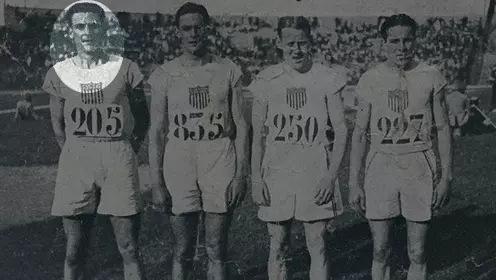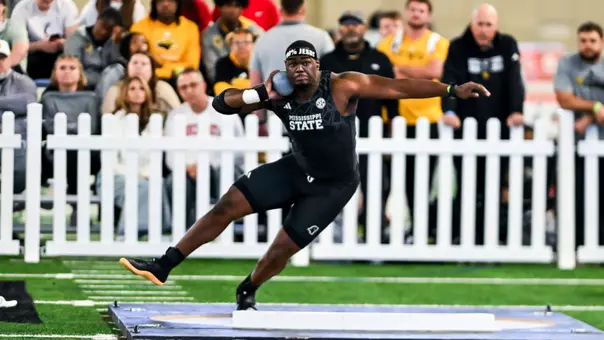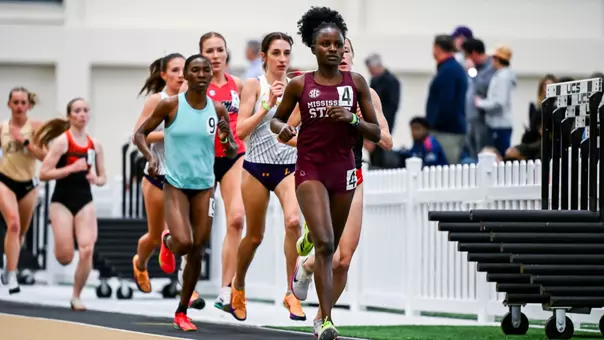
A Century Since Gold
July 13, 2024 | Track & Field, Olympic Games
The story of Commodore Scott Cochran and Mississippi State’s first Olympic medal
Commodore Scott Cochran was something of an outlier.
Not just in the way that elite, Olympic-level athletes are outliers from the general public. In fact, in his time, such distinctions were arguably less noticeable than they are today. Cochran and his teammates were by no means professional athletes – such a thing was forbidden in Olympic competition in the first half of the 20th century – but more so than that, they pursued careers as commonplace as anyone might today.
Alongside Cochran in the United States' 4x400m relay lineup at the 1924 Paris Games were a dentist and dog breeder, a lawyer and an athletics official. Cochran himself would go on to coach his younger brother in track and field.
No, what made Cochran unique was less what he would go on to do and more where he came from before all of this started.
Born in small Richton, Mississippi – a town that since 1910 has never once reported a population greater than 1,400 people in the U.S. census – Cochran was the son of farmers and the oldest of 10 children in the family.
"There wasn't much money and not much to do, so they ran. They ran everywhere," Janice Cochran-Pendleton, his niece, said in an article for the Mississippi Sports Hall of Fame. "They ran to school. They raced each other. They ran for the fun of it. If they wanted to go somewhere, they went on foot. If they had to get there fast, they ran."
Cochran-Pendleton's father was Roy Cochran, the very brother that Commodore coached to a pair of Olympic medals in 1948.
Cochran's eldest son David later expounded on his tale for the Hall of Fame.
"He waited till he was six before attending the one-room schoolhouse down the road, so that he could take his younger sister Edna," David said. "Then he graduated at 16 to attend Mississippi State in Starkville, an ROTC College. At 20, he graduated as a second lieutenant in the National Guard."
At the time, the world of track and field was very different than it is today. J.W. Bailey's famed "The M Book of Athletics," which chronicles early Mississippi State athletics history, reported in 1930 that Cochran along with MSU's first Olympian Don Scott and Cochran's Olympic teammate Lee Priester were up to that time the only three southern athletes to have ever won a national championship in track and field.
Such a statement would be unrecognizable today. Since 1982, when the NCAA began also sponsoring a women's championship in track and field, the winning team has come from a state north of the Mason-Dixon line just seven times combined between both genders. Meanwhile, a current member of the SEC has won 57 of 82 titles in that span.
With a national championship under his belt, Cochran began attending various all-comers meets, earning the nickname of "Race Horse" before he graduated from MSU. He began to run for the Olympic Club of San Francisco and made his way to the 1924 Olympic Trials; however, it was there that his journey nearly derailed.
"In the 1924 Olympic Trials, he failed to make the 400m team due to severe muscle cramping from the three-day train ride," David reported. "However Olympic coach 'Dink' Templeton knew that 'Speed' Cochran had the best 400m time in the world and took my dad to Paris as an alternate."
So Cochran traveled to what has become known as one of the most-significant and historically-impactful Olympic Games in history.
Much has been made of the significance of the Olympics returning to Paris in 2024 for the first time in 100 years. The 1924 Games were the first in history to feature some of the hallmarks of the event fans recognize today. Paris was the site of the first Olympic Village, housing 3,089 athletes including 135 women. This year's games are expected to draw 10.500 athletes with roughly half of those being women.
Forty-four nations sent athletes to Paris and more than 1,000 journalists, including radio broadcasters, covered the games. It was the first time the Olympics had ever been broadcast over the air.
1924 also saw the creation of the Closing Ceremony, but it is perhaps most well-known for its Hollywood fame. That year's Games were the setting for the 1982 Oscar-winning film "Chariots of Fire" and saw American Johnny Weissmuller win three gold medals in swimming before going on to star as Tarzan in 1932.
Aside from the cultural curiosities and trivia tidbits provided by Paris in 1924, as in every Games there were records to be broken. This is where Cochran's story resumes.
The United States can boast all but one world-record time in the men's 4x400m relay. Jamaica broke the Americans' 20-year-old mark at the 1952 Helsinki Olympics, but Team USA reclaimed the standard in 1960 at the Rome Games. When Cochran and company took the track that fateful day in July 1924, the world record stood at three minutes and 16.6 seconds where it was set a dozen years prior at the Stockholm Olympics of 1912.
"[Cochran] was put up first as he had the best start and led the whole way," David said of his father.
Bailey's M Book reports that trackside reporters considered Cochran's opening leg "the fastest 400m ever run by a human being." By all accounts, from the sound of the starter's pistol, Cochran led and never looked back.
Following the Games, Cochran would match up against Switzerland's Josef Imbach who had clocked an Olympic-record and unofficial world-record 48.0 flat in the 400m in Paris. The two went head-to-head at the Belgium Exhibition Games where Cochran reportedly "won with ease."
"Floating in fully 10 or 12 yards ahead of his nearest rival, Cochran passed the baton to the second American runner, paving the way for an American victory and, incidentally, the establishment of a new world record," Bailey wrote.
That second runner was William Edward Stevenson, the lawyer. He'd been born in Chicago and graduated from Princeton before studying law at Oxford. At the time of the Olympics, he was an assistant U.S. attorney for the southern district of New York. He went on to earn the Bronze Star with his wife during World War II for the couple's administration of American Red Cross operations in Great Britain, North Africa, Sicily and Italy and, in 1946, became president of Oberlin College.
Stevenson would hand off to dentist and beagle breeder J. Oliver Macdonald. He'd had a highly-decorated career at Penn, winning 91 total medals in high school and college before joining the Olympic team. After retiring from dentistry, he went on to sell real estate in New Jersey.
Alan Helffrich anchored the relay. When he died in February 1994, Helffrich was thought to be the oldest living U.S. Olympian. He was the captain of the U.S. team and later became the first American to defeat Finish star Paavo Nurmi, who had made history in Paris by becoming the first athlete to ever win five gold medals in a single Games. Helffrich made a career organizing and officiating track meets following the Games.
When Helffrich crossed the line in Paris, the official's watch read 3:16.0. They had done it. A mere six-tenths of a second was the only difference, but Cochran and his teammates had established a new world record that would stand until the Americans ran 3:14.2 in 1928.
And what became of Cochran?
"He was very modest of his Olympic achievements," David said to the Hall of Fame. "I never heard him say much about it, but throughout his life people would buy him a drink if given the chance. I think his fame introduced him to many people both rich and poor. Once you have been an Olympic champion, life is pretty humdrum... He worked for the Veteran's Administration assisting fellow soldiers adjust to civilian life."
Today, the world record stands a 2:54.20 where it was established in 1993. The stadium that Cochran raced in, now known as Yves du Manoir Stadium, still stands and will once again host Olympic competition in 2024; however, it will only be used for field hockey.
Cochran's efforts opened the door for Mississippi State athletes to continue racing to glory. Bulldogs have won a total of eight Olympic medals, including three more in track and field. Two of those came in the same event as Cochran. Falilat Ogunkoya is the only Bulldog woman to win a medal, claiming a silver in the 4x400m relay in Atlanta in 1996 with Nigeria. Jude Monye took Nigeria to a gold-medal performance in the following Olympiad, being awarded the medal after the Americans were disqualified at the Sydney Games in 2000.
This year, State will send a program-record nine athletes in a school-record four sports to Paris. Three of those sports – basketball, soccer and tennis – have never been represented before. While a few Bulldogs are serious medal contenders, one in particular stands out in light of Cochran's anniversary and MSU's history.
Lee Eppie failed to qualify for the open 400m, much like Cochran failed to qualify at the Trials a century ago, but Botswana named him to its 4x400m relay pool, an event where it clocked a world-leading time at the World Athletics Relays earlier this year.
"I know a couple bits of history about them," Eppie said of State's past 4x400m medalists. "I've seen them every time I was walking through our locker room. I always see their pictures put up there. I was like, 'You know, one day, I want to be up there too, so my goal is to go there, make something, get a medal with my team and then hopefully, I'll be up there too."
Not just in the way that elite, Olympic-level athletes are outliers from the general public. In fact, in his time, such distinctions were arguably less noticeable than they are today. Cochran and his teammates were by no means professional athletes – such a thing was forbidden in Olympic competition in the first half of the 20th century – but more so than that, they pursued careers as commonplace as anyone might today.
Alongside Cochran in the United States' 4x400m relay lineup at the 1924 Paris Games were a dentist and dog breeder, a lawyer and an athletics official. Cochran himself would go on to coach his younger brother in track and field.
No, what made Cochran unique was less what he would go on to do and more where he came from before all of this started.
Born in small Richton, Mississippi – a town that since 1910 has never once reported a population greater than 1,400 people in the U.S. census – Cochran was the son of farmers and the oldest of 10 children in the family.
"There wasn't much money and not much to do, so they ran. They ran everywhere," Janice Cochran-Pendleton, his niece, said in an article for the Mississippi Sports Hall of Fame. "They ran to school. They raced each other. They ran for the fun of it. If they wanted to go somewhere, they went on foot. If they had to get there fast, they ran."
Cochran-Pendleton's father was Roy Cochran, the very brother that Commodore coached to a pair of Olympic medals in 1948.
Cochran's eldest son David later expounded on his tale for the Hall of Fame.
"He waited till he was six before attending the one-room schoolhouse down the road, so that he could take his younger sister Edna," David said. "Then he graduated at 16 to attend Mississippi State in Starkville, an ROTC College. At 20, he graduated as a second lieutenant in the National Guard."
At the time, the world of track and field was very different than it is today. J.W. Bailey's famed "The M Book of Athletics," which chronicles early Mississippi State athletics history, reported in 1930 that Cochran along with MSU's first Olympian Don Scott and Cochran's Olympic teammate Lee Priester were up to that time the only three southern athletes to have ever won a national championship in track and field.
Such a statement would be unrecognizable today. Since 1982, when the NCAA began also sponsoring a women's championship in track and field, the winning team has come from a state north of the Mason-Dixon line just seven times combined between both genders. Meanwhile, a current member of the SEC has won 57 of 82 titles in that span.
With a national championship under his belt, Cochran began attending various all-comers meets, earning the nickname of "Race Horse" before he graduated from MSU. He began to run for the Olympic Club of San Francisco and made his way to the 1924 Olympic Trials; however, it was there that his journey nearly derailed.
"In the 1924 Olympic Trials, he failed to make the 400m team due to severe muscle cramping from the three-day train ride," David reported. "However Olympic coach 'Dink' Templeton knew that 'Speed' Cochran had the best 400m time in the world and took my dad to Paris as an alternate."
So Cochran traveled to what has become known as one of the most-significant and historically-impactful Olympic Games in history.
Much has been made of the significance of the Olympics returning to Paris in 2024 for the first time in 100 years. The 1924 Games were the first in history to feature some of the hallmarks of the event fans recognize today. Paris was the site of the first Olympic Village, housing 3,089 athletes including 135 women. This year's games are expected to draw 10.500 athletes with roughly half of those being women.
Forty-four nations sent athletes to Paris and more than 1,000 journalists, including radio broadcasters, covered the games. It was the first time the Olympics had ever been broadcast over the air.
1924 also saw the creation of the Closing Ceremony, but it is perhaps most well-known for its Hollywood fame. That year's Games were the setting for the 1982 Oscar-winning film "Chariots of Fire" and saw American Johnny Weissmuller win three gold medals in swimming before going on to star as Tarzan in 1932.
Aside from the cultural curiosities and trivia tidbits provided by Paris in 1924, as in every Games there were records to be broken. This is where Cochran's story resumes.
The United States can boast all but one world-record time in the men's 4x400m relay. Jamaica broke the Americans' 20-year-old mark at the 1952 Helsinki Olympics, but Team USA reclaimed the standard in 1960 at the Rome Games. When Cochran and company took the track that fateful day in July 1924, the world record stood at three minutes and 16.6 seconds where it was set a dozen years prior at the Stockholm Olympics of 1912.
"[Cochran] was put up first as he had the best start and led the whole way," David said of his father.
Bailey's M Book reports that trackside reporters considered Cochran's opening leg "the fastest 400m ever run by a human being." By all accounts, from the sound of the starter's pistol, Cochran led and never looked back.
Following the Games, Cochran would match up against Switzerland's Josef Imbach who had clocked an Olympic-record and unofficial world-record 48.0 flat in the 400m in Paris. The two went head-to-head at the Belgium Exhibition Games where Cochran reportedly "won with ease."
"Floating in fully 10 or 12 yards ahead of his nearest rival, Cochran passed the baton to the second American runner, paving the way for an American victory and, incidentally, the establishment of a new world record," Bailey wrote.
That second runner was William Edward Stevenson, the lawyer. He'd been born in Chicago and graduated from Princeton before studying law at Oxford. At the time of the Olympics, he was an assistant U.S. attorney for the southern district of New York. He went on to earn the Bronze Star with his wife during World War II for the couple's administration of American Red Cross operations in Great Britain, North Africa, Sicily and Italy and, in 1946, became president of Oberlin College.
Stevenson would hand off to dentist and beagle breeder J. Oliver Macdonald. He'd had a highly-decorated career at Penn, winning 91 total medals in high school and college before joining the Olympic team. After retiring from dentistry, he went on to sell real estate in New Jersey.
Alan Helffrich anchored the relay. When he died in February 1994, Helffrich was thought to be the oldest living U.S. Olympian. He was the captain of the U.S. team and later became the first American to defeat Finish star Paavo Nurmi, who had made history in Paris by becoming the first athlete to ever win five gold medals in a single Games. Helffrich made a career organizing and officiating track meets following the Games.
When Helffrich crossed the line in Paris, the official's watch read 3:16.0. They had done it. A mere six-tenths of a second was the only difference, but Cochran and his teammates had established a new world record that would stand until the Americans ran 3:14.2 in 1928.
And what became of Cochran?
"He was very modest of his Olympic achievements," David said to the Hall of Fame. "I never heard him say much about it, but throughout his life people would buy him a drink if given the chance. I think his fame introduced him to many people both rich and poor. Once you have been an Olympic champion, life is pretty humdrum... He worked for the Veteran's Administration assisting fellow soldiers adjust to civilian life."
Today, the world record stands a 2:54.20 where it was established in 1993. The stadium that Cochran raced in, now known as Yves du Manoir Stadium, still stands and will once again host Olympic competition in 2024; however, it will only be used for field hockey.
Cochran's efforts opened the door for Mississippi State athletes to continue racing to glory. Bulldogs have won a total of eight Olympic medals, including three more in track and field. Two of those came in the same event as Cochran. Falilat Ogunkoya is the only Bulldog woman to win a medal, claiming a silver in the 4x400m relay in Atlanta in 1996 with Nigeria. Jude Monye took Nigeria to a gold-medal performance in the following Olympiad, being awarded the medal after the Americans were disqualified at the Sydney Games in 2000.
This year, State will send a program-record nine athletes in a school-record four sports to Paris. Three of those sports – basketball, soccer and tennis – have never been represented before. While a few Bulldogs are serious medal contenders, one in particular stands out in light of Cochran's anniversary and MSU's history.
Lee Eppie failed to qualify for the open 400m, much like Cochran failed to qualify at the Trials a century ago, but Botswana named him to its 4x400m relay pool, an event where it clocked a world-leading time at the World Athletics Relays earlier this year.
"I know a couple bits of history about them," Eppie said of State's past 4x400m medalists. "I've seen them every time I was walking through our locker room. I always see their pictures put up there. I was like, 'You know, one day, I want to be up there too, so my goal is to go there, make something, get a medal with my team and then hopefully, I'll be up there too."
Players Mentioned
OLYMPIC GAMES | Navasky Anderson's Olympic Journey
Monday, July 29
OLYMPIC GAMES | Marco Arop's Olympic Journey
Thursday, July 25
OLYMPIC GAMES | Anderson Peters' Olympic Journey
Monday, July 22
OLYMPIC GAMES | Ilana Izquierdo's Olympic Journey
Sunday, July 21








